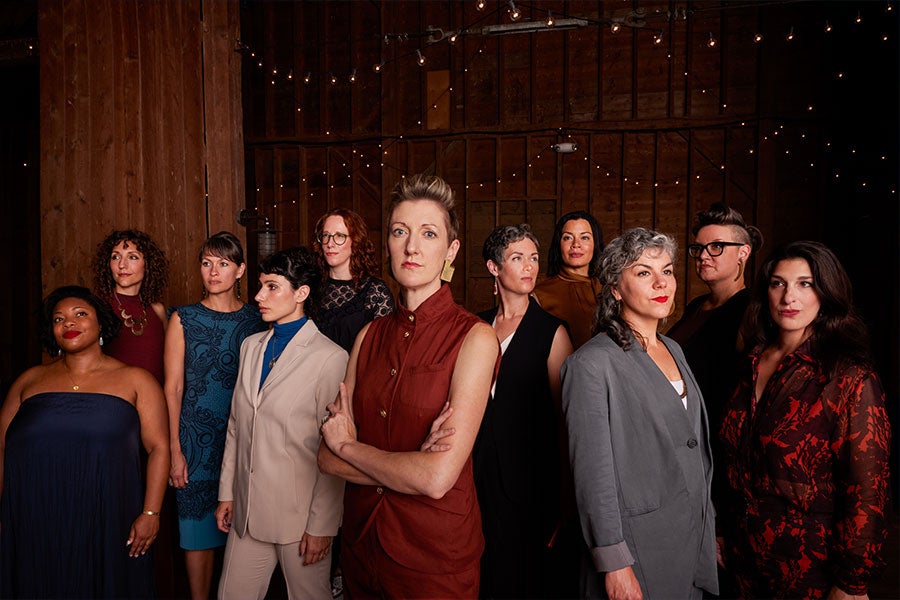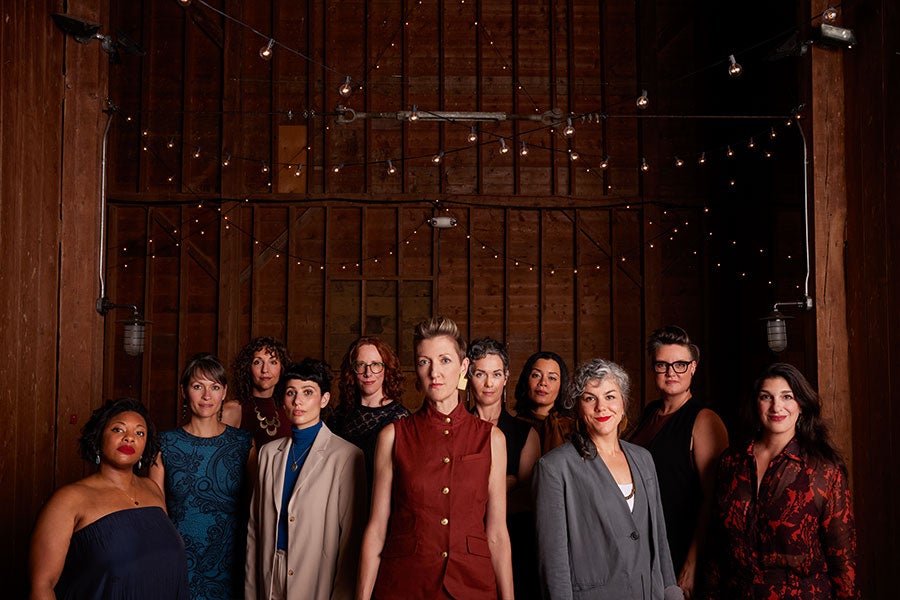Forward-Thinking
Beth Willer ’03, founder and artistic director of the Grammy-nominated Lorelei Ensemble, is carving out new musical terrain.
“I credit much of my expansive thinking about style and genre to my diverse experiences at Luther,” she says. Beth, who studied trumpet performance and vocal music education, played in Concert Band, where she says Fred Nyline “did an incredible amount of contemporary repertoire and avant garde works with us that stretched my ears quite a bit.” She also played in Jazz Band under Tony Guzmán ’90, a mentor in both performance and music education.

Beth Willer ’03 helps build inventive, challenging repertoire for treble choirs as founder and artistic director of the Grammy-nominated Lorelei Ensemble.
Like many people, however, Beth held a bias about treble choirs. “I thought a treble choir was inferior. That it was a stepping stone, something you did as a freshman or because you didn’t get into the mixed choir,” she says. (Luther’s own associate professor Jill Wilson confirmed in a 2012 publication that stigmas against treble choirs exist as early as high school.)
But singing under Sandra Peter in Pike Kor (now Aurora) was a turning point for Beth, illustrating just how powerful treble choirs could be: “Sandra was unearthing repertoire that was written for women to sing in public spaces. There’s just not that much of it in the historic repertoire, but she was actively seeking it out and making editions and studying it at a time when that was less common.”
The impact of this carried through to Beth’s first teaching job, in Eau Claire, Wis., where she directed choirs of alto and soprano voices. At Boston University, she earned an MM and DMA while continuing to direct treble choirs. In class one day, graduate composition student Mary Koppel offered her a brand-new piece. Beth was compelled to put together a group to sing it.
And so began the Lorelei Ensemble.
Formed in 2007, Lorelei is passionately committed to expanding the repertoire for treble vocal ensembles. As founder and artistic director, Beth puts the current number of new works she’s commissioned at 70.
As Lorelei has evolved, Beth says, “Eventually I’ve been able to focus our mission even more by thinking not just about the repertoire, but the vocal aesthetic and the sounds that we ask sopranos and altos to make in ensembles. Historically, the ‘ideal’ soprano or alto sound has commonly been modeled on the voices of men and boys. The unique capability of the adult female voice wasn’t celebrated in the choral setting, and therefore, the broad palette of color that is available is often not on display in ensembles. That’s really at the heart of what I’m trying to do here: celebrate the breadth and depth and expansiveness of the female voice.”
The library of sounds that Lorelei singers draw on is vast. At turns, they’re eerie and hypnotic, razor-sharp and precise, unified “like the lungs of a larger body” (Washington Post), dissonant to the point of discomfort, smooth and resonant, biting and creaky and gasping.

Beth Willer '03 with the Lorelei Ensemble
The ensemble doesn’t shy away from challenging subject matter either. In commissioning pieces, Beth often bounces ideas back and forth with composers. Sometimes they’ll decide to combine historical and modern texts, as they did in James Kallenbach’s Antigone, which used the framework of Sophocles’s play to tell the story of Sophie Scholl, a young female activist resisting the state in Nazi Germany. Opera News named the recording a Critic’s Choice.
Another recent piece, Her Story by composer Julia Wolfe, commissioned for the 100th anniversary of the 19th Amendment and performed with symphonies across the U.S., includes text from Abigail Adams and Sojourner Truth. In late February, Lorelei performed it at the Kennedy Center, in what the Washington Post called a “bracing history lesson.” The New York Times called it “a refined yet blistering account of the misogyny that American women have endured.”
This year, Lorelei earned a 2025 Grammy nomination for its performance of Christopher Cerrone’s Beaufort Scales, commissioned by Lorelei, which sets the poetic 19th-century scale used to measure wind strength against the backdrop of our era of extreme weather and the role of technology in climate change.
With Lorelei looming so large in the world of chamber music, it’s easy to lose sight of the fact that the ensemble is a nonprofit reliant on fundraising, grants, and individual donors. This requires a lot of bandwidth, as does Beth’s role as associate professor and director of choral studies at Johns Hopkins’s Peabody Institute, where she designed and directs the conservatory’s graduate program in choral conducting.
“I would never want a career without teaching,” she says. “And for me, it’s a dream come true to teach at an institution that is innovative and new-art-forward. It draws students who are not only interested in excellence but are also interested in the future of their art form. I think that’s how you make a career: by participating in and building the future of the art form. Whether that’s through playing historical repertoire or new repertoire, we have to be forward-thinking.”
Lorelei performed as part of Luther’s Center Stage Series in 2018, and we hope to welcome them back in the future. To learn more about the ensemble, visit loreleiensemble.com. To learn more about the choral conducting program that Beth directs, visit peabody.jhu.edu.